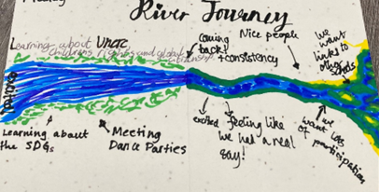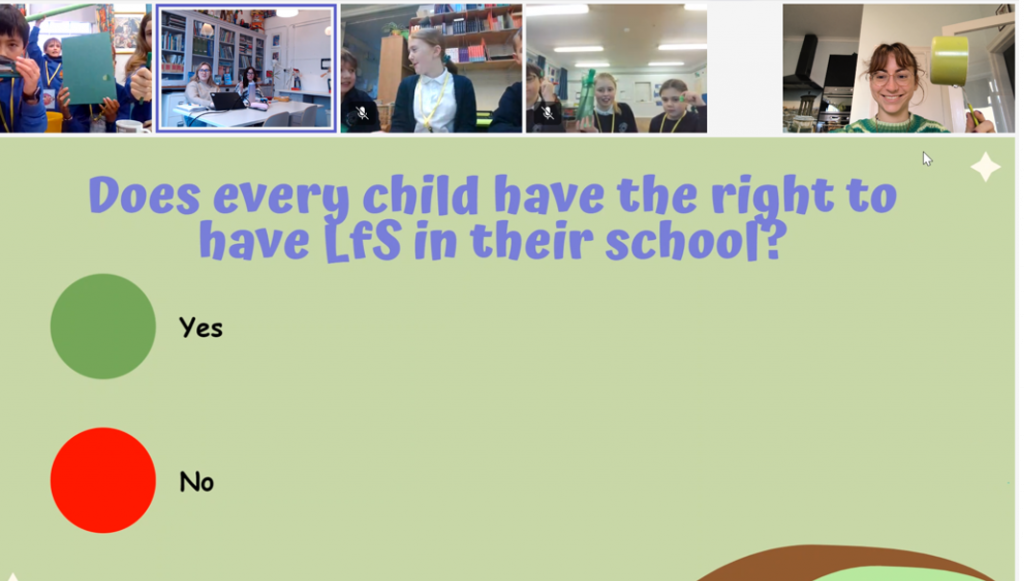It’s giving us a go at leading and sharing.
Member of Children’s Parliament
Children’s Parliament is working with Scottish Government to share children’s views, ideas and opinions on the new Learning for Sustainability guidelines published in the Target 2030 Action Plan.
To celebrate reaching the halfway mark of our Learning for Sustainability journey, and to inform our ongoing work with Scottish Government, Sophia, Children’s Parliament’s Learning for Sustainability lead worker, sat down with four Members of Children’s Parliament. Each member has participated in our core group, known as the ‘Learning for Sustainability Investigators’.
The children have been stars on the project, sharing their ideas and views with us during our two-year partnership with their primary school.

Krithi: We have worked with other children and Children’s Parliament to understand what Learning for Sustainability is, and the UNCRC, and why it is important.
Maddy: It was also a bit about learning what Learning for Sustainability is. Before, we didn’t know as much. Also, we didn’t know that it was actually about us as children. The project was about building an understanding of what it is like in Scotland for Learning for Sustainability and for children.
Gordon: In the workshops, we have done lots of different tasks on outdoor learning, global citizenship, and climate change. Also, we were helping the younger children understand these things with your [Children’s Parliament’s] help. We also did things like make posters to share our ideas.
Maddy: Also, I think, because we have done a second step to this project, I feel like I think adults know we had the ideas [about Learning for Sustainability policy] but they still need to check with us about what children in Scotland want and need from the government. Like, they want to know if they have heard us right, and we are saying “yes, that sounds right”, or “no, that’s not what we want”.
Krithi: I think it was quite child-friendly. I am not sure completely, because as always, they could make it more.
Maddy: I think so. When we did it, I think it was really good because there was lots of explanation about Learning for Sustainability. It was the kind of explanation that was actually about what we were doing, and what children’s rights actually are, rather than just a general picture like we sometimes get in school. I do think it would help if there was a really big explanation from Scottish Government though, like a really big general view of what’s going on in Scotland and what adults are trying to do for children’s rights. That would be good.
Toby: Sometimes, it doesn’t make a big enough change on the topic of LfS if you just talk to [adults around you]. I don’t feel like there is anywhere else that I would know to talk about influencing Learning for Sustainability, if I wasn’t part of Children’s Parliament, or if there was another change I wanted to make. I wouldn’t really know who to talk to.
Maddy: I think our school is really great because we have so many representatives and stuff in school. But there is always going to be someone who will not be represented if it’s in school, because they can only do, like, so much. I wouldn’t know where to start if I was not getting represented, but I know that I would like to talk to elected decision makers.
Krithi: It’s good that we [children] are doing this, and we should do it more because it’s good to have every child’s voice heard. And there could be like, ideas that could probably change quickly. I wish all schools could do it too.
Toby: It felt good because you just like get to have a say, and also get to share what you think, and things are actually taken into account because of what you said, it’s pretty amazing. And if every child got to do that, that would be amazing. Also, like, getting to do the Children’s Parliament workshops, some people think it is just doing fun games and stuff, but we are actually getting to do sustainability and Learning for Sustainability in real life. Sometimes it doesn’t even feel like learning, it’s just, like, giving us a go at leading and sharing.
Krithi: I also think one of the great things about this project was that it was, I think most school activities and extra stuff we get to do, it might stop after a few meetings or a year. I think one of the amazing things was that it kept going. It was consistent, we never do the same thing over and over again, but the adults keep asking us our opinion and we get to share it. We also get to help younger children be a part of it now too! Hopefully soon, every child in Scotland will get to know about it and share their ideas too.
Maddy: I felt like it was important for children to be a part of this because they should know the real facts about what needs to be improved for their rights, to know that the world is not perfect, especially with climate change and stuff. Children think differently from adults, so if it’s just adults making all the big decisions, it might not be right for how children grow up with those decisions. If it was just adults in the Leadership Group, they wouldn’t get to hear about our different ways of thinking about how to solve it.
Gordon: I was happy when I found out adults were coming to talk to us about Learning for Sustainability again! I didn’t think I had done and learned enough about Learning for Sustainability just in the first project, and I was excited when we heard we were going to do it again.
Krithi: [On UNCRC Incorporation] I wish I had heard about UNCRC incorporation. It would have made me feel much better about climate change and children’s environmental rights. I like the wording of the UNCRC.
Toby: [On UNCRC Incorporation] I feel good because it’s a good thing. I guess it’s not only good though, because Scotland wouldn’t have had to make it happen if the situation isn’t a bit bad, like with climate change too. It would be great to prevent problems from happening, so we don’t need it. We are already in a position where children are not having their rights respected in some places in Scotland.
Maddy: I think it would be very useful if we had more resources children could access at home on Learning for Sustainability and children’s human rights. If we could do it at home, not just at school, maybe we could invite even more children in. And eventually we will have 35, or more, children on Zoom!
Krithi: I want children all across the world to get to have the same changes as us. Every child should be treated the same. Right now, some people have opportunities and others don’t, which is not fair. Even if some children don’t have a home, it’s not fair that they don’t get opportunities like this.
Maddy: I would like us to learn about Learning for Sustainability from other schools outside Scotland. It’s good to know what children’s rights are like and how Scotland is different.

Thank you to all our wonderful Members of Children’s Parliament, and the four Investigators who helped to create this blog. Thank you as well to our friends at Scottish Government for funding and supporting this project. We look forward to contributing to children’s human rights case studies through this blog.
To find out more about the project as a whole, check out our project webpage here: childrensparliament.org.uk/our-work/learning-for-sustainability/